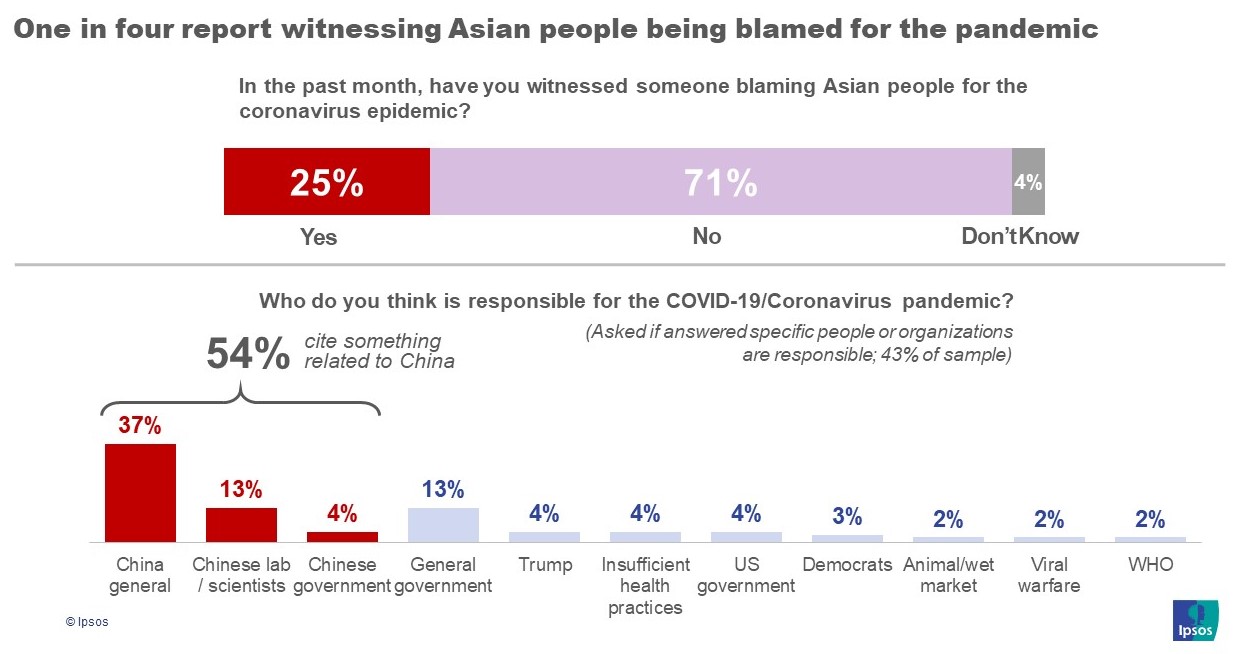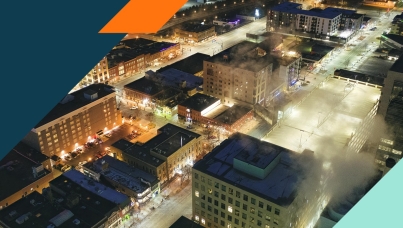One in four have recently witnessed Asian people being blamed for the coronavirus pandemic
Washington, DC, March 21, 2021 — As violence against Asian Americans is on the rise, including a recent mass shooting of seven people of Asian descent in Atlanta, a new USA Today/Ipsos poll finds that a quarter of Americans have witnessed someone blaming Asian people for the coronavirus pandemic. However, this represents a decline from last April, when one-third witnessed this. While a majority of Americans believe the coronavirus pandemic is a natural disaster (views are unchanged from last year), around a quarter of all Americans blame China for the pandemic.
Detailed Findings
1. A quarter of Americans have witnessed Asian people being blamed for the coronavirus pandemic. However, awareness of such incidents varies greatly by race/ethnicity and partisanship.
- Currently, 25% have witnessed this type of blame, down seven percentage points from last April – just one month after the pandemic was declared a national emergency in the U.S.
- As was the case in last year’s poll, Black, Hispanic, and Asian respondents are significantly more likely than white respondents to say they have seen blame directed at Asian people.
- Currently, 18% of white respondents have witnessed this, compared to 46% of Asian respondents, 40% of Black respondents, and 34% of Hispanic respondents.
- Democrats are almost twice as likely as Republicans to report witnessing this in the past month (33% vs. 18%, respectively).
2. A majority of Americans believe the coronavirus pandemic is a natural disaster, rather than caused by specific people or organizations. Views have not shifted on this since last year.
- Fifty-seven percent see the pandemic as a natural disaster, while 43% point to specific people or organizations as being responsible. This is on par with last year’s poll (56% vs. 44%).
- As was the case last year, a majority of Republicans (59%) feel responsibility lies in the lands of specific people or organizations. A majority of Democrats (74%) believe it is a natural disaster.
- Around two-thirds of people of color (ranging from 65-66%) believe the pandemic is a natural disaster, compared to 53% of white, non-Hispanic respondents.
3. Among those that cite specific people/organizations for creating the coronavirus pandemic, most blame China.
- Fifty-four percent of these people, which equates to just under a quarter of all Americans, think China (including Chinese labs, scientists, or the government) is responsible for the coronavirus pandemic.
- Among the 59% of Republicans that say specific people or organizations are responsible for this, 71% cite China.

4. While reported incidents of blame directed at Asian people has declined compared to last year, concerns over coming close to Asian people not using protective gear (e.g. masks) have risen.
- Currently, 21% say they are concerned about coming close to someone of Asian ancestry in public, relatively unchanged from last year’s 24%.
- However, a majority (54%) are concerned about coming close to someone of Asian ancestry who is not using protective gear – up eight points from last year.
- Though this number has increased, the level of concern over coming into contact with anyone not using protective gear has not (72%, compared to 70% last April).
For more on this story, please click here.
About the Study
These are some of the findings of an Ipsos poll conducted between March 18-19, 2021, on behalf USA Today. For this survey, a sample of 1,195 adults age 18+ from the continental U.S., Alaska, and Hawaii was interviewed online in English. The sample includes 402 Republicans, 569 Democrats, and 150 Independents.
The sample was randomly drawn from Ipsos’ online panel, partner online panel sources, and “river” sampling and does not rely on a population frame in the traditional sense. Ipsos uses fixed sample targets, unique to each study, in drawing a sample. After a sample has been obtained from the Ipsos panel, Ipsos calibrates respondent characteristics to be representative of the U.S. Population using standard procedures such as raking-ratio adjustments. The source of these population targets is U.S. Census 2018 American Community Survey data. The sample drawn for this study reflects fixed sample targets on demographics. Posthoc weights were made to the population characteristics on gender, age, race/ethnicity, region, and education.
Statistical margins of error are not applicable to online non-probability polls. All sample surveys and polls may be subject to other sources of error, including, but not limited to coverage error and measurement error. Where figures do not sum to 100, this is due to the effects of rounding. The precision of Ipsos online polls is measured using a credibility interval. In this case, the poll has a credibility interval of plus or minus 3.2 percentage points for all respondents. Ipsos calculates a design effect (DEFF) for each study based on the variation of the weights, following the formula of Kish (1965). This study had a credibility interval adjusted for design effect of the following (n=1,195, DEFF=1.5, adjusted Confidence Interval=+/-4.7 percentage points).
The poll also has a credibility interval of plus or minus 5.6 percentage points for Republicans, plus or minus 4.7 percentage points for Democrats, and plus or minus 9.1 percentage points for Independents.
For more information on this news release, please contact:
Mallory Newall
Director, U.S., Public Affairs
Ipsos
+1 202 420-2014
[email protected]
Kate Silverstein
Media Relations Specialist, U.S., Public Affairs
Ipsos
+1 718 755-8829
[email protected]
About Ipsos
Ipsos is the world’s third largest Insights and Analytics company, present in 90 markets and employing more than 18,000 people.
Our passionately curious research professionals, analysts and scientists have built unique multi-specialist capabilities that provide true understanding and powerful insights into the actions, opinions and motivations of citizens, consumers, patients, customers or employees. We serve more than 5000 clients across the world with 75 business solutions.
Founded in France in 1975, Ipsos is listed on the Euronext Paris since July 1st, 1999. The company is part of the SBF 120 and the Mid-60 index and is eligible for the Deferred Settlement Service (SRD).
ISIN code FR0000073298, Reuters ISOS.PA, Bloomberg IPS:FP www.ipsos.com



